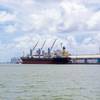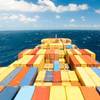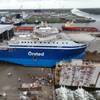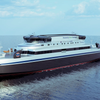Australia’s offshore maritime security is to be further strengthened through a series of linked initiatives that will be implemented progressively through 2005.
These measures, recommended by the Government’s Taskforce on Offshore Maritime Security, build on previously announced border protection and maritime security initiatives. They focus, in particular, on the protection of Australia’s offshore oil and gas facilities, and on ensuring that any terrorist threat to Australia’s maritime assets and our coastline can be quickly detected and defeated. In implementing these initiatives the government is committing a further $10.6 million to the more than $187 million we have committed to upgrading off-shore maritime security since July 2004.
The Australian Government will assume direct responsibility for counter-terrorism prevention, interdiction and response in all offshore areas of Australia. This approach will allow the States and the Northern Territory to focus on their clear responsibility for initial counter-terrorism incident response and security arrangements within ports.
This integrated approach to enhancing maritime security in Australia’s offshore areas has several key elements.
The Australian Defence Force will take responsibility for offshore counter-terrorism prevention, interdiction and response capabilities and activities, including the protection of offshore oil and gas facilities and the offshore interdiction of ships. At present, the arrangements for Defence Force involvement in counter-terrorism in Australia’s offshore areas are in response to specific requests from civil authorities. The Australian Customs Service will retain responsibility for civil maritime surveillance and regulatory roles currently undertaken or coordinated by the Coastwatch Division of the Australian Customs Service.
To ensure an integrated approach that can draw, as necessary, on the full range of Australian Defence Force and Customs capabilities and make the best use of available resources, a Joint Offshore Protection Command, will be established by March 2005. The Joint Command will be responsible for the implementation, coordination and management of off-shore maritime security.
This new single Command will link the Defence Force responsibility with that undertaken by the Coastwatch Division of the Australian Customs Service. The Command will have a joint accountability structure, being responsible to the Chief of the Defence Force for its military functions and to the Chief Executive Officer of Customs for its civil functions. The Director-General of Coastwatch, Rear Admiral Russ Crane, will also be the Commander of the Joint Offshore Protection Command. Additional funding of $5.6m over four years will be allocated for the establishment of the Joint Command.
Based on cooperative international arrangements, including with neighbouring countries, the Australian Government also intends to establish a Maritime Identification Zone. This will extend up to 1,000 nautical miles from Australia’s coastline. On entering this Zone vessels proposing to enter Australian ports will be required to provide comprehensive information such as ship identity, crew, cargo, location, course, speed and intended port of arrival. Within Australia’s 200 nautical mile exclusive economic zone, the aim will be to identify all vessels, other than day recreational boats. The collection and coordination of this maritime information will improve the effectiveness of civil and military maritime surveillance in support of key tasks such as border and fisheries protection, as well as counter-terrorism response and interdiction. The Zone will be managed by the Joint Offshore Protection Command at an additional cost of $4m over four years. The protection of Australia’s oil and gas facilities is a key focus of the Australian Government’s priorities to enhance offshore maritime security.
A program of augmented security patrols of Australia’s oil and gas fields in the Timor Sea and on the North West Shelf, will be implemented as a matter of priority. The introduction of these additional patrols takes into account the threat assessments prepared by the Australian Security Intelligence Organisation, and the economic value of these facilities. The patrols will use available Defence Force and Customs patrol assets, which will be increased by the acquisition of the two additional Armidale Class Patrol Boats announced in September 2004.
Some of the oil and gas facilities in the Timor Sea are in areas where Australia shares jurisdiction with Indonesia or East Timor. The Minister for Foreign Affairs will be writing to his counterparts to advise of our intentions to work with those countries in introducing these mutually-beneficial enhanced counter-terrorism security measures.
The Australian Government will continue to support the further development of multilateral and bilateral agreements to strengthen offshore maritime security and counter-terrorism measures.
The direct protection of each offshore platform through the provision of appropriate on-site security measures is an industry responsibility. It represents the final element in the Government’s integrated approach to enhanced offshore maritime security. To assist industry, the Maritime Transport Security Act 2003 (MTSA) will be extended to apply to offshore oil and gas facilities to provide the necessary advice and oversight in the implementation of any necessary additional security measures. This task is being coordinated by the Department of Transport and Regional Services and will be completed for formal implementation by 30 September 2005.
The maritime security plans that are to be developed in accordance with the MTSA will have regard for the special nature and location of these offshore facilities, the practical needs of operators and the need to complement, rather than duplicate, existing risk management and safety plans.
Sponsored Content
Chris-Marine’s solutions help to prolong engine lifetime

Subscribe for
Maritime Reporter E-News
Maritime Reporter E-News is the maritime industry's largest circulation and most authoritative ENews Service, delivered to your Email five times per week









